
Magento SEO - Optimizing Magento Websites for Search Engines
In this article, we will discuss the importance of Magento SEO for online store owners. We will highlight the best practices to improve Magento 2 SEO. It includes content marketing and engaging and informative content that attracts organic traffic.
It includes Magento SEO best practices such as content marketing, structured data markup, and product page optimization. We’ll discuss the default Magento settings and a Magento SEO checklist to improve site ranking.
What is Magento SEO?
Magento SEO is the process of optimizing your Magento store to improve its visibility and ranking in search engine results pages (SERPs). You know that search engine optimization is used to drive organic traffic to your store. It ensures your Magento site is discoverable by potential customers searching for products similar to what you offer. Many custom web design companies also focus on Magento SEO to create visually appealing, highly optimized sites that attract and retain traffic.
Magento search engine optimization helps increase the quality and quantity of incoming traffic. You can break down all SEO on Magento into technical SEO, backlinks, and keyword optimization.
The SEO extensions are installed from the Magento admin panel and help reach better ranking positions.
There are over 250,000+ active Magento stores with increasing competition in the online marketplace. It is more important than ever to prioritize SEO to stay ahead of the competition.
Magento offers many great features for SEO, such as a robots.txt file, sitemap.xml, and multiple ways to redirect pages. However, some Magento SEO issues that you need to be aware of include:
- Duplicate content from the navigation
- Improper canonical tags
- Lack of blogging functionality.
Why is SEO important for Magento websites?
Magento SEO is essential to improve their online presence, attract organic traffic, and increase sales. With proper SEO techniques, Magento store owners can improve their website visibility on search engines. SEO helps to drive more traffic to the site and increase its revenue.
Magento 2 Search Engine Optimization Benefits
| Benefits of Magento SEO | Description |
|---|---|
| Improve search engine rankings | SEO optimized Magento stores can rank higher in search engine results pages (SERPs) for relevant keywords and phrases. Your site gets increased visibility and traffic. |
| Drive organic traffic | People who are searching for products or services will find your website more easily, increasing the likelihood of making a sale. |
| Increase brand awareness | With higher visibility in search engine results, your brand will become more recognizable to potential customers. Even if they don't immediately make a purchase. It leads to increased brand awareness and loyalty in the long run. |
| Better user experience | Optimizing your store makes it easier to navigate, optimizing page load speeds, and providing valuable content. You can keep users on your site longer and increase the likelihood that they will convert. |
| Improved brand credibility | With higher search engine results and providing valuable content to your users, you improve the credibility and authority of your brand. It leads to increased trust and loyalty from your customers. |
| Increased sales | Increased traffic, and improved user experience can ultimately lead to increased sales and revenue for your Magento store. |
How to Make your Magento Website Rank Well on Search Engines?
Once you get the importance of Magento SEO, the next step is implementing the the SEO strategies. It will help your website rank well in search engine results pages. Here are some key areas to focus on:
1. Magento SEO Content Marketing
Creating high-quality and engaging site content optimizes your Magento store's SEO. Here are some tips to help you get started:
-
Develop a content strategy that suits your business goals and target audience.
-
Conduct keyword research to identify relevant and high-traffic keywords.
-
Create informative content that is optimized for search engines.
-
Optimize your content for readability and user experience. Use headings, bullet points, and optimized images.
-
Create content that provides value to your target audience. It should answer the frequently asked questions, solve their problems, or provide helpful information.
-
Promote your content through social media, email marketing, and other channels to attract more traffic.
What is the role of content marketing in improving SEO for Magento stores?
Content marketing improves SEO for Magento stores by:
-
Providing value to customers through engaging and insightful content.
-
Helping establish your brand as an authority in your industry.
-
Attracting more traffic to your site. It leads to higher conversion rates and increased revenue.
What types of content are best for improving Magento 2 SEO?
Regarding content marketing for Magento SEO, several types of content can be used to improve SEO, including
- Blog posts.
- Product descriptions.
- Product reviews
- Client testimonials
- How-to guides and tutorials
- Infographics
- Videos
How can you create engaging content that attracts organic traffic for Magento 2 websites?
To create an effective content marketing strategy for Magento SEO, it's essential to understand content strategy. It includes content optimization, keyword research, and blogging.
2. Structured Data Markup for Magento SEO
Structured data markup is a code added to your website's HTML. It helps search engines understand your content better.
Structured data markup provides search engines with specific details about the content on your website. It includes such type of content, the author, the date published, and other essential details. It helps search engines offer more accurate and relevant search results.
Benefits of structured data markup on your Magento store for SEO purposes include-
-
Increased visibility in search results Structured data markup helps your Magento website appear more prominently in other search engine results. Search engines get a clearer understanding of your content.
-
Rich Snippets Structured data markup can also help your website display rich snippets in search results. It increases click-through rates and drives more traffic to your site.
-
Google Knowledge Graph By using structured data markup, you can also help Google build its Knowledge Graph. It is a database of entities and their relationships to one another. It helps your website appear in featured snippets and rich search results.
How to implement Structured Data in your Magento 2 website?
You can add structured data for different page templates on your Magento store, including-
-
Organization for the home page
-
CollectionPage and BreadcrumbList for category pages
-
Product and BreadcrumbList for product pages
-
Article for blogs
-
Contact pages
CollectionPage schema signals to Google that category pages contain a collection of different products. It provides vital information about each one.
Product schema tells Google that the page contains information about a particular SKU. It ideally contains key properties such as name, description, image, price, SKU, and aggregate rating.
3. Optimizing Product Pages for Magento SEO
Here are some best practices for optimizing product pages in Magento:
-
Conduct keyword research: Keyword research helps identify the relevant keywords that customers use to search for products similar to yours. Use the target keywords in the seo-friendly URL structure, title and meta description, and product description.
-
Optimize product images Use high-quality images that showcase your product from different angles. Optimize the image file names, alt tags, and captions with relevant keywords. Perform the reverse image lookup to find similar images related to your product. Alternatively, you can also explore Lenso AI reverse image search for broader visual discovery. It will help you to better know how to display your product. It will help you to better know how to display your product.
-
Write informative product descriptions Write informative and detailed product descriptions. It should highlight the product's unique features, benefits, and specifications. Use keywords naturally in the description and avoid keyword stuffing.
-
On-page optimization techniques Use on-page optimization techniques such as heading tags (H1, H2, H3), internal linking, and social media share buttons. Use structured data markup to make your product pages more search engine-friendly.
-
Create unique content for your target audience Create unique content that stands out. It includes product videos, customer reviews, and user-generated content.
-
Conduct SEO audits There will always be optimization issues that cannot be noticed at first glance. That is why regularly auditing your website is an indispensable part of any successful SEO strategy. Use specialized software like SE Ranking SEO Checker to examine all aspects of your product pages, detect issues that harm your performance, fix them, and monitor whether your optimization works.
Incorporating these best practices will help to improve the SEO of your Magento product pages. You will see an increase in their visibility on search engine results pages.
Magento SEO Best Practices Checklist
1. Control crawling and indexing
Faceted navigations create huge crawling and indexing issues. It increases the number of pages that can be crawled.
Pages in faceted navigation will only either sort or narrow existing products. Such pages create duplicate pages and similar content. Here are some ways to ensure Google crawls and indexes pages correctly:
-
Conduct an audit to identify low-quality pages indexed due to faceted navigation.
-
Implement noindex or canonical tags to remove low-quality pages from the index.
-
Review log files to find any low-quality pages that are being crawled.
-
Consider only allowing pages with high search potential to be indexed.
-
Block the crawl of low-value parameters through the robots.txt file.
2. JavaScript rendering
If JavaScript is required to load key content on a page, Google must perform a two-step indexing process. It processes the initial HTML and then returns to the site to render any content loaded via JavaScript.
Where SEOs need to check in the second stage of the indexing process. It ensures that Google can see all of the content on the page.
If any elements are loaded via JavaScript, check whether they are indexed.
-
See if JavaScript-loaded content is being indexed correctly.
-
Use tools like The Mobile Friendly Testing Tool and the Rich Results Test. It verifies what Googlebot can render on the page.
-
Manually check the index by identifying content loaded via JavaScript and using a "site:" search operator. It will verify that Google can read that text on the page.
3. Magento 2 URL Paths
-
Remove the
.htmlextension from the end of URLs to create cleaner and more readable URLs for the store. -
Implement 301 status codes for redirects instead of 302.
-
Create permanent redirects for URLs.
-
Use 1:1 redirects for individual pages to ensure that you can redirect old pages easily
-
Use Magento's feature to create redirects when URLs are changed automatically.
4. On-page content optimization
Setting title tags, meta descriptions, and URLs for individual products using the "Search Engine Optimization" dropdown. Magento offers it as a default feature.
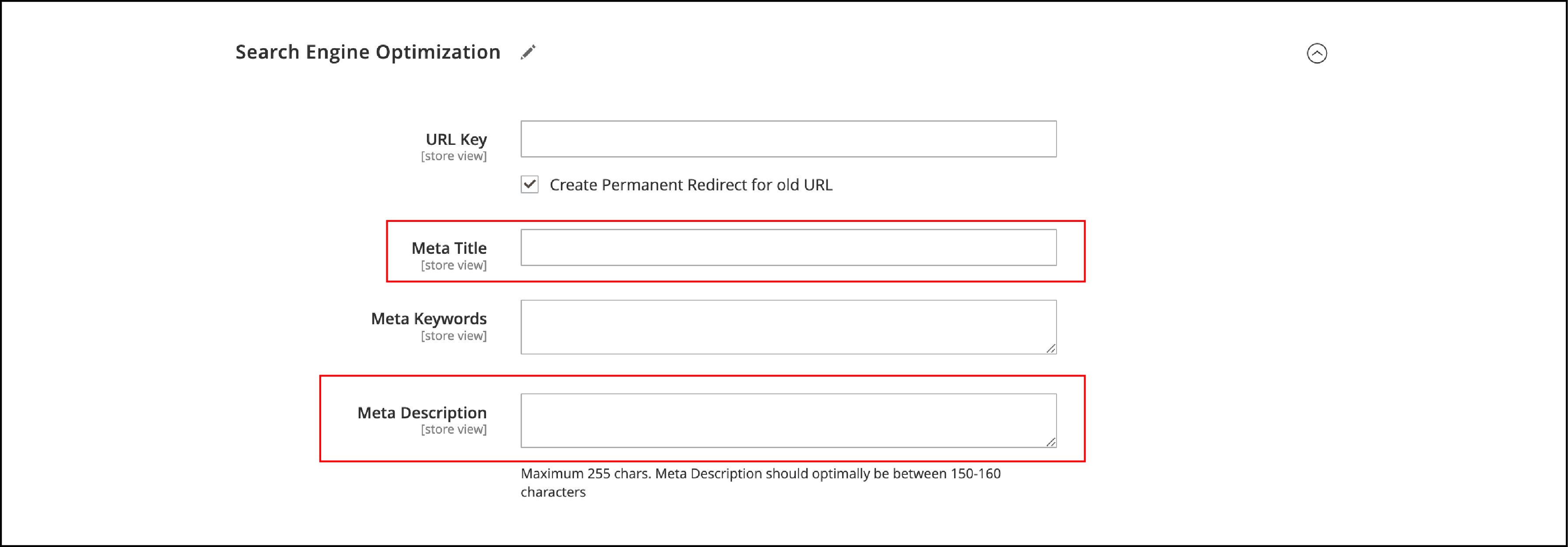
5. Related Products
Adding “Related Products” to product pages improves several SEO aspects of your site. It enhances user experience and offers more upsell opportunities. The internal links will help Google discover and distribute the link equity.
-
Set
Related Productson individual product pages. -
Add related products to all product pages.
-
Improve the user experience and engagement by showing similar products.
-
Generate more revenue by showing upsell opportunities.
-
Offer internal links for Google to discover and distribute link equity.

6. Blogging Functionality
Magento does not offer a blogging functionality by default settings. A blog on your e-commerce site will give you more opportunities to rank well in search results.
A blog provides a natural place for informational content to live. It is increasingly essential for ranking keywords. One option is to use the Magento 2 Blog Extension. You can also set up a blog on WordPress and create a subdomain for your Magento store.
Check out 👉 Magento WordPress Integration Tutorial to add your WordPress blog in Magento.
Google ranks informational content that is people-first. It includes guides, affiliate sites, or “how to” content. It gives preference to user-intended information over product and category pages. Informational content linking to your products can help Magento stores’ SEO success.
7. Metadata in Magento 2 SEO
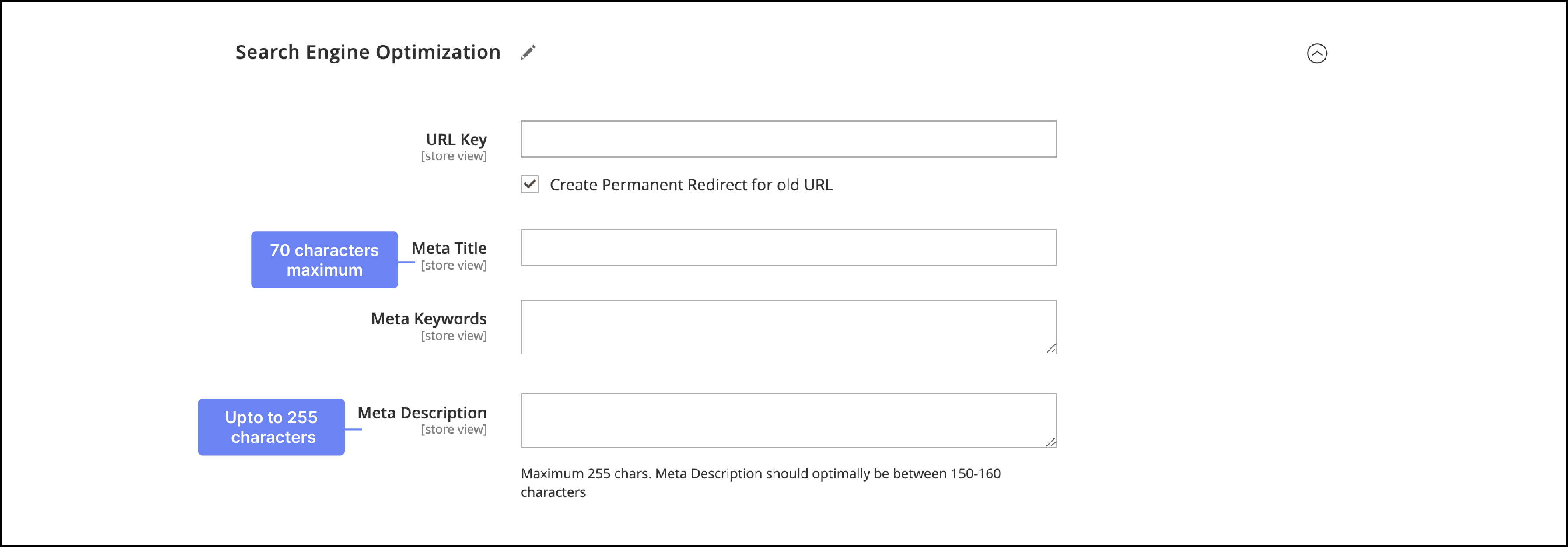
Metadata in Magento 2 SEO affects how search engine crawlers index your site. It provides visitors with information about what the website contains.
The information is not displayed on the Magento website but written in the code, which is invisible to users. The metadata is shown on the search results for the web crawlers' search engine to estimate the site.
Use keyword-rich data for better SEO performance-
For product page metadata, go to Catalog -> Product -> Choose a product -> Search Engine Optimization to start configuring.
The three main types of metadata. It includes Meta titles, Meta Keywords, and Meta Descriptions.
-
Meta Title The meta title appears as the title of your product page in the search results. It should include high-value keywords (limited to under 70 characters).
-
Meta Keywords Meta keywords are shown in the SERPs and have no maximum limit. Include only related keywords.
-
Meta Description It has a maximum limit of 160 characters. Optimization can raise more clicks through the search. Include some keyword phrases to attract more customers.
Meta Data for Product Setting for Magento 2 store
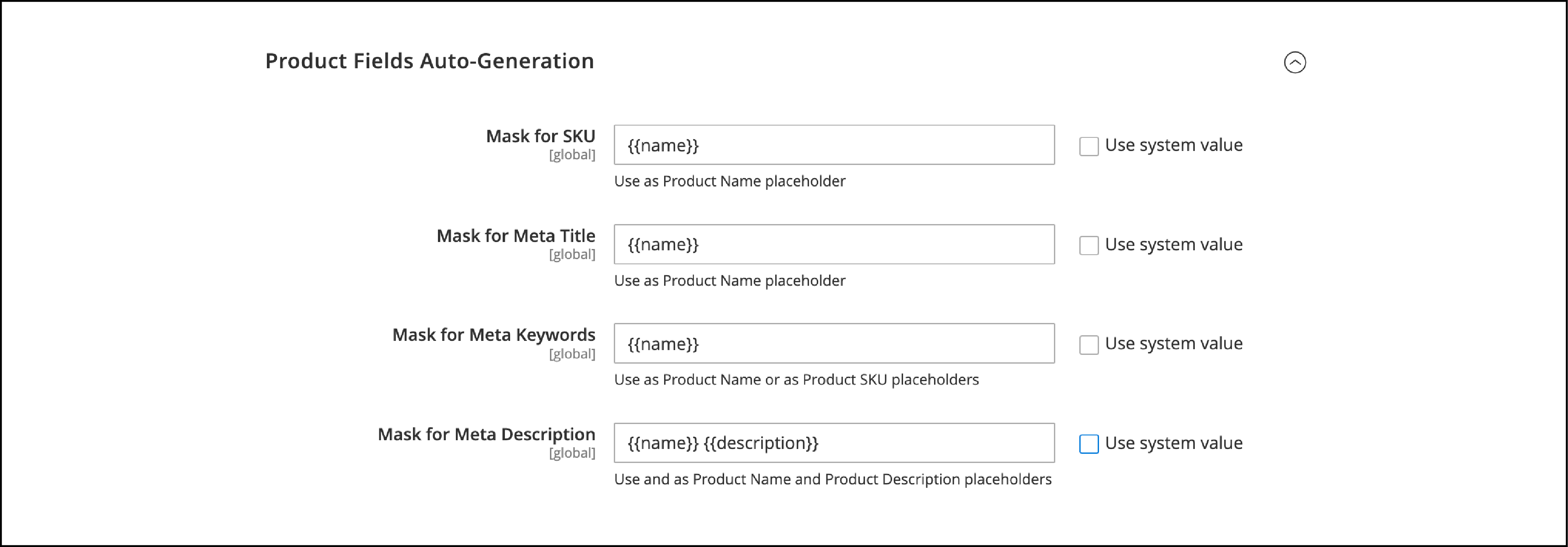
You may have a large-scale Magento site with thousands of items to manage. The settings below in the Magento 2 SEO guide will help. It sets a template for the metadata of products at a global level.
For mass settings for product metadata:
Go to Stores ⇒ Configuration ⇒ Catalog ⇒ Catalog ⇒ Product Fields Auto-Generation.
Make a sample for meta titles, descriptions, and keywords for all products of the Magento 2 store.
You can add meta tags for categories, CMS pages, and Homepage and get it customized.
The Magento 2 SEO Module can auto-add metadata for products and categories. It is helpful to remove the limitations of the default Magento settings.
8. Meta tags for the Home page:
The Magento 2 Home page is often the first page that customers see. Optimizing its meta tags for products and the main page is crucial to make a good impression.
To edit Magento 2 page title:
- Go to Content > Pages
- Open Home Page in the edit mode
- And add a custom title in the Page Title field
- Save the changes.
9. Canonical tags:
Canonical tags are essential for indicating the preferred URL structure when multiple URLs exist for the same content. It reduces the risk of duplicate content issues.
Enable the canonical tags for categories. Go to Stores > Configuration > Catalog > Search Engine Optimization:
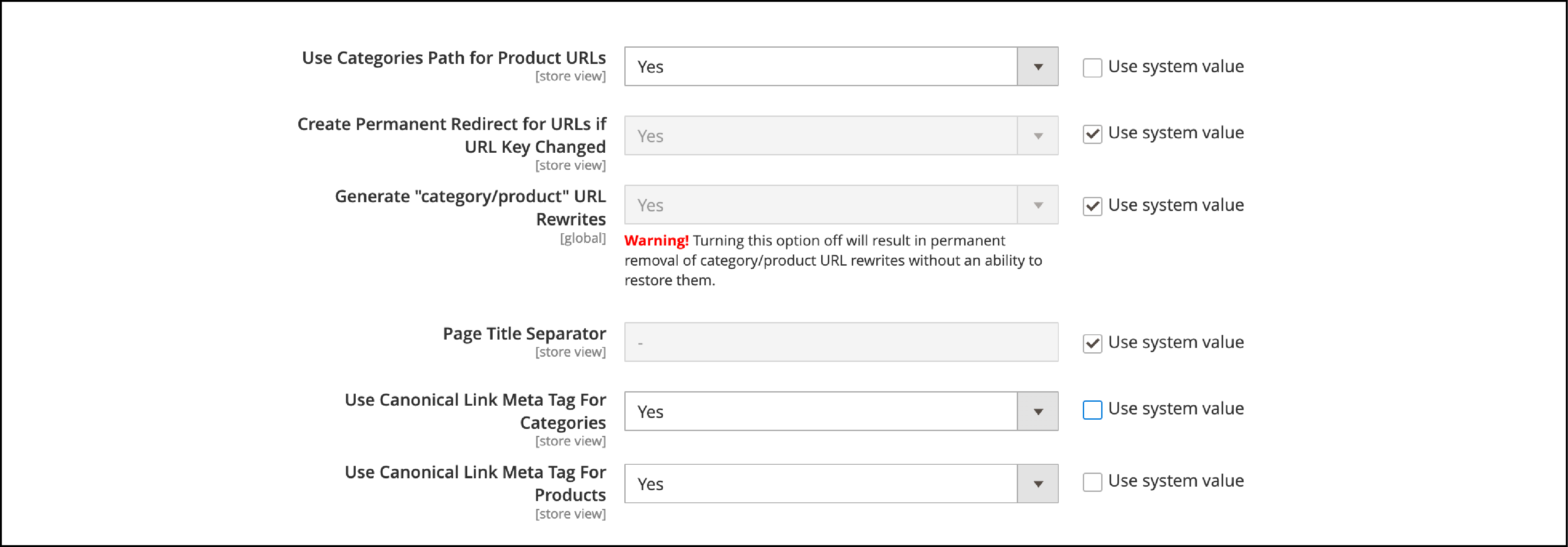
10. Images optimization for Magento 2
Optimizing images can improve page load times and overall user experience, positively impacting SEO.
In Magento 2, you can add alt attributes for product images.Go to Product > Edit > Images And Videos > Image > Alt Text.
Change the alt text for your logo image from Magento Commerce to something related to your brand. Navigate to Stores > Configuration > General > Design > HTML Head > Header
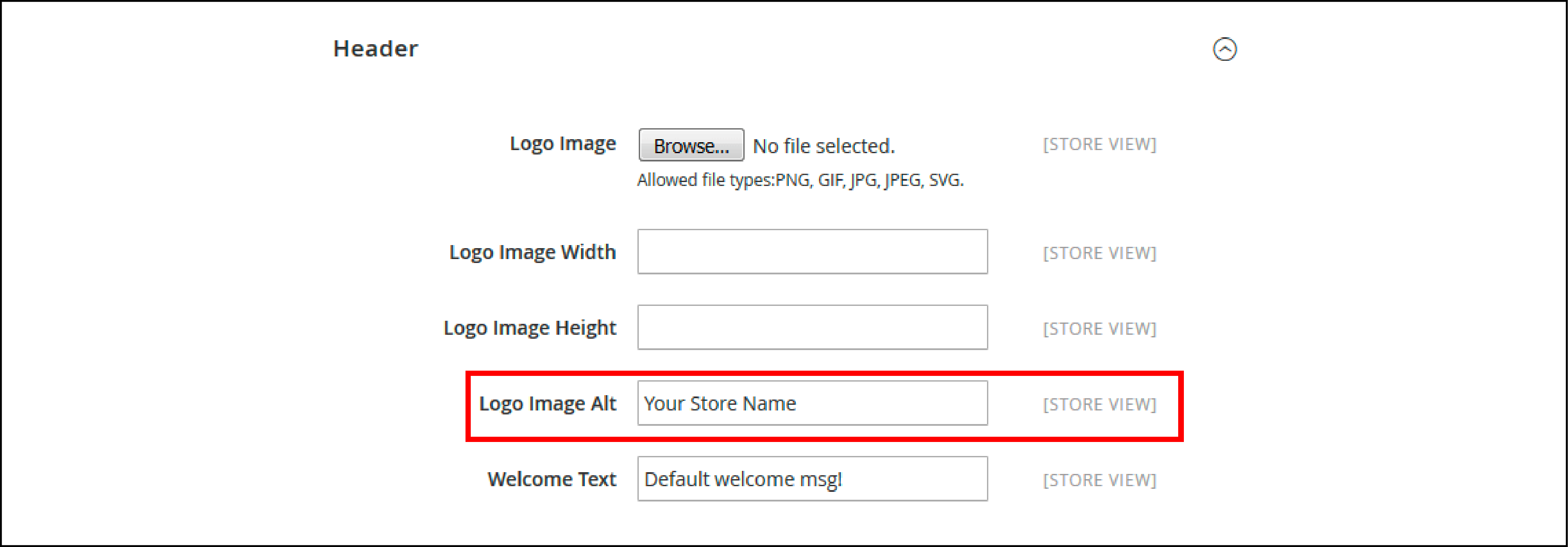
11. Google Analytics and Google AdWords-
Integrating Google Analytics and Google AdWords into your Magento site can help you track and analyze your SEO performance. It also optimizes your marketing campaigns.
- Google Analytics for Magento 2 SEO
Magento 2 offers a Google Analytics tracking code to your store. Go to Stores > Configuration > Sales > Google API > Google Analytics.
Check out: How to Add Google Analytics Code to Magento 2
- Google AdWords and Magento 2
Developers have made implementing Google AdWords easier for merchants. Navigate to Stores > Configuration > Sales > Google API > Google AdWords, and you will see all the needed settings: Conversion ID, Format, Color, etc. are seen in your Google AdWords account.
Tutorial Guide: How to Configure Google Adwords in Magento 2.
Best Magento SEO Extensions
Magento offers a range of extensions and plugins to optimize your online store for search engines. You get additional features and functionalities to improve your website's SEO performance.
Here are some popular Magento extensions and plugins for SEO:
| Magento SEO Extensions/Plugins | Description |
|---|---|
| XML Sitemap | Easily exclude categories, product types, product IDs, and CMS pages from XML sitemap. Add metadata, divide into sections, customize interface. |
| HTML Sitemap | Create HTML sitemap with products, categories, CMS pages, and additional links. Exclude specific links, customize URL key, display in footer/header. |
| Canonical Tag | Set up canonical tags for products, category pages, and homepage easily. |
| Hreflang Tag | Add Hreflang tags for each store view and enable them for homepage, product, category page, and CMS pages. |
| Meta Tag Template | Create meta tag templates for products and category pages with multiple variables. |
| ALT Tag Template | Create Alt tag templates and name templates for images. |
| Rich Snippets | Set up various snippets for products on SERPs. Show rich snippets for categories, display breadcrumbs in SERPs, include site search box in SERPs. |
| Advanced Breadcrumbs | Supports Use Short URL Path and Use Long URL Path breadcrumbs. Determine breadcrumbs by category ID. |
| 301 Redirects | Optimize user experience when accessing deleted product pages. |
| External Links | Set external links as No-follow links. |
| Smart SEO Analysis | Quickly check current SEO compliance of each element. |
| SEO Report | Shows bar to indicate meta title and meta description text length. |
| SEO Audit | Provides notifications of website's SEO compliance, including metadata, primary keyword, description, and outbound links. |
Using these Magento extensions improves your website's SEO performance. It will attract more organic traffic to your online store.
Monitoring and Adjusting Magento SEO Performance
It is essential to monitor and adjust your Magento store's SEO performance regularly. Metrics to track the Magento SEO Performance:
You should track several metrics to evaluate your SEO performance, such as:
-
Organic traffic: Check the monthly number of visitors that visit your site through organic search.
-
Bounce rate: The percentage of visitors who leave your site after viewing only one page.
-
Click-through rate (CTR): The percentage of people who click on your website's link after seeing it in search results.
-
Conversion rate: The percentage of visitors who purchase on your website.
-
Keyword ranking: Where your website ranks on search engines for specific keywords.
-
Data-driven decisions Monitoring these metrics helps make data-driven decisions to improve your Magento store's SEO.
Use tools like Google Analytics to track these metrics and identify areas you need to improve. For example, improve your website's user experience or optimize your landing pages if your bounce rate is high.
Managed Magento hosting for Fast Loading Magento Website
The speed of your Magento website plays a crucial role in its search engine optimization (SEO) performance.
Slow loading times can result in lower search engine rankings and lost traffic. Your Magento website should load quickly to improve your SEO.
One way to achieve fast loading speeds is through Magento server speed optimization. Managed hosting providers offer features such as server optimization, performance monitoring, and security checks. It enhances your website's loading speed and overall search engine optimization.
Managed Magento hosting solutions also provide automatic backups, server updates, and expert support. It frees up your time to optimize your SEO without worrying about technical issues.
Check how the Magento hosting server impacts SEO.
Summary
Key takeaways from this article on Magento SEO include optimizing your Magento store for search engines. We covered controlling crawling and indexing, implementing structured data markup, and optimizing product pages. You can use SEO extensions and plugins for Magento and monitor the optimization results.
A managed hosting solution can provide numerous benefits for Magento SEO, including faster site speed. To improve your Magento store's SEO performance, track key metrics. It includes organic traffic, search engine rankings, and conversion rates.
By following best practices for Magento SEO, online store owners can improve their visibility in search engine results pages. You can attract organic traffic and ultimately increase sales and revenue.
Get more insights about Magento 2 on the MGT Commerce Blog.







